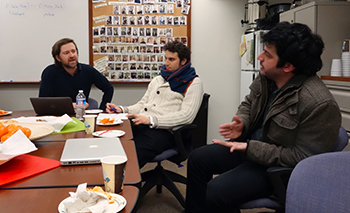

![]()
home
::: about
::: news
::: links
::: giving
::: contact
![]()
events
::: calendar
::: lunchtime
::: annual
lecture series
::: conferences
![]()
people
::: visiting fellows
::: postdoc fellows
::: resident fellows
::: associates
![]()
joining
::: visiting fellowships
::: postdoc fellowships
::: senior fellowships
::: resident fellowships
::: associateships
![]()
being here
::: visiting
::: the last donut
::: photo album
|
A New Idea There is an imbalance in our philosophical community. It has institutionalized powerful communal procedures for destroying. We do it almost as a matter of course in question time in talks. We expect it in referees' reports on our papers. Why do we have no communal structures for creating ideas? That magic is supposed to happen privately, behind closed doors, in the solitude of your office. Can we not help each other create? Our Center is a place that can and should provide those structures. From time to time, with that in mind, I try something a little different in our reading group. It has to be something gentle since this sort of activity is not a part of our culture. I expect suspicions. Sometimes the proposal is elaborate. This time it is not. The previous week I sketched it. Would we be willing to try this?
The group was willing to try, but they were casting about for problems. What if you found the idea in this past week? Would it still count? We extended the time window to two weeks prior to our next meeting. The day of the next meeting arrived. For this meeting I'd brought some tangerines and a few pastries. It has to be tangerines and not oranges, I'd learned to my cost. Citrus only works for this group if it can be peeled easily.
Who will go first? There is the usual silence. I took the first slot. It was my plan all along. I try to show by example how things can be done. The five minute time limit on the explanatory speech seems less draconian if I am its first victim. I inverted the five minute glass and went to the white board to describe something that had grabbed my attention. When my sand had run out, I was not sure what to expect. The feeling seemed shared in the room. The room was quiet. But then the comments started to come and quite soon I was taking notes rapidly of useful leads in the literature. My eye was half on the notes and half on the clock. After fifteen minutes, I knew we'd have to stop if we were going to fit everyone into our less than two hour meeting. I started to do the arithmetic, but it was already clear that there would be trouble. Perhaps some ideas might take less time, I speculated optimistically. The next idea took twenty five minutes and the next twenty. It was becoming very clear that we'd not fit everyone into one week. We'd carry it over to the next week. The last went for over half an hour. I'd boasted foolishly at the start that we will fit everyone in since I am chairing. I now gave up trying to speed the discussion. We are philosophers. We elaborate. We are not sharp, short and to the point. When it was over, I canvassed the room. "Well--what do you think? Did it work?" After a long delay someone said "There were no great moments." Serves me right, I thought, for fishing for compliments. But my sense was that something useful had happened. We'd had discussions of new ideas that were impossible to limit. Lowering my sights, I added plaintively, "...Was it a waste of time?" Recalling that we are better communally at destroying, I shifted the focus. "How could it have been done better?" That produced a more relaxed response. It is much easier to say what is wrong than what is right. "We need more time--more time for discussion and for the ideas to develop." That was quite right, an apt observation. I'd noticed this in discussions big and small in philosophy. They typically start with people talking past each other. If there isn't enough time and good will, they may end that way; and that is common in question time after a talk. It may take many exchanges before the mischaracterizations and miscommunications are corrected and the real connections begin. I suppose it's like instant soup and instant coffee. They are both quick, but they just don't quite work. It went well enough, but I'll admit it was a little deflating. After the table had been cleared and cleaned, Allan I were the only ones left in the room. He leaned towards me and whispered, "We are doing the right thing: kicking around concepts."
John D. Norton
|





